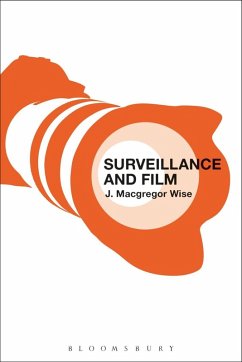Winner of the Surveillance Studies Network Book Award: 2017
Surveillance is a common feature of everyday life. But how are we to make sense of or understand what surveillance is, how we should feel about it, and what, if anything, can we do? Surveillance and Film is an engaging and accessible book that maps out important themes in how popular culture imagines surveillance by examining key feature films that prominently address the subject. Drawing on dozens of examples from around the world, J. Macgregor Wise analyzes films that focus on those who watch (like Rear Window, Peeping Tom, Disturbia, Gigante, and The Lives of Others), films that focus on those who are watched (like The Conversation, Caché, and Ed TV), films that feature surveillance societies (like 1984, THX 1138, V for Vendetta, The Handmaid's Tale, The Truman Show, and Minority Report), surveillance procedural films (from The Naked City, to Hong Kong's Eye in the Sky, The Infernal Affairs Trilogy, and the Overheard Trilogy of films), and films that interrogate the aesthetics of the surveillance image itself (like Sliver, Dhobi Ghat (Mumbai Diaries), Der Riese, and Look). Wise uses these films to describe key models of understanding surveillance (like Big Brother, Panopticism, or the Control Society) as well as to raise issues of voyeurism, trust, ethics, technology, visibility, identity, privacy, and control that are essential elements of today's culture of surveillance. The text features questions for further discussion as well as lists of additional films that engage these topics.
Surveillance is a common feature of everyday life. But how are we to make sense of or understand what surveillance is, how we should feel about it, and what, if anything, can we do? Surveillance and Film is an engaging and accessible book that maps out important themes in how popular culture imagines surveillance by examining key feature films that prominently address the subject. Drawing on dozens of examples from around the world, J. Macgregor Wise analyzes films that focus on those who watch (like Rear Window, Peeping Tom, Disturbia, Gigante, and The Lives of Others), films that focus on those who are watched (like The Conversation, Caché, and Ed TV), films that feature surveillance societies (like 1984, THX 1138, V for Vendetta, The Handmaid's Tale, The Truman Show, and Minority Report), surveillance procedural films (from The Naked City, to Hong Kong's Eye in the Sky, The Infernal Affairs Trilogy, and the Overheard Trilogy of films), and films that interrogate the aesthetics of the surveillance image itself (like Sliver, Dhobi Ghat (Mumbai Diaries), Der Riese, and Look). Wise uses these films to describe key models of understanding surveillance (like Big Brother, Panopticism, or the Control Society) as well as to raise issues of voyeurism, trust, ethics, technology, visibility, identity, privacy, and control that are essential elements of today's culture of surveillance. The text features questions for further discussion as well as lists of additional films that engage these topics.


